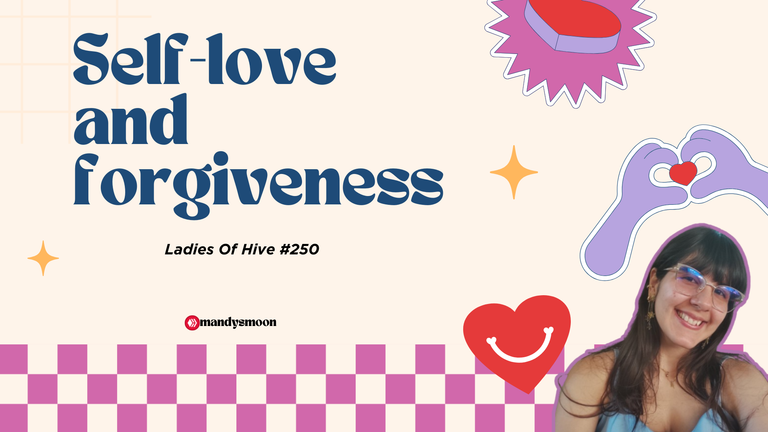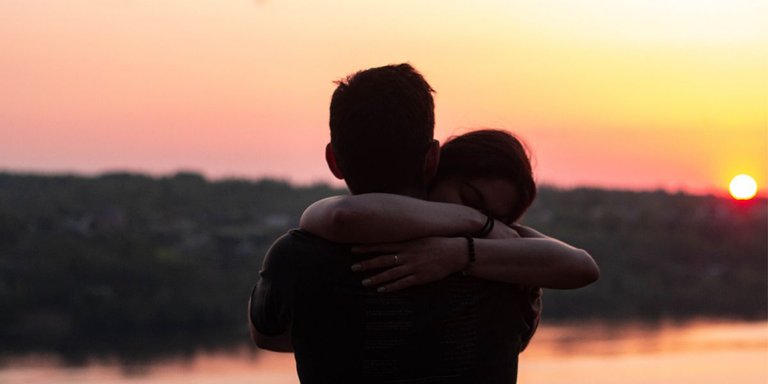[ENG] [ESP] LoH #250: Amor propio y el perdón | Self-love and forgiveness
Hey there, Hive!✨
¡Hola, Hive!✨
Mi amiga @naath , quien ya participó en esta linda iniciativa con un muy buen post, me invitó a participar también. Lo cierto es que ya tenía pensado este post para hoy porque las preguntas propuestas por @cautiva-30 me parecieron tópicos buenísimos para tratar, así que les comentaré mi reflexiones sobre el amor propio y el perdón
My friend @naath , who already did her entry in this lovely initiative with a very good post, invited me to participate too. The truth is that I had already planned this post for today because the questions proposed by @cautiva-30 seemed like great topics to discuss, so I will share my thoughts on self-love and forgiveness


Esta me parece una pregunta bastante importante e interesante puesto que he escuchado decir una innumerable cantidad de veces que «siempre debemos perdonar y ser la persona más madura». Mi perspectiva es que aunque sí debemos perdonar para poder continuar y darle un cierre a cierto momento de nuestras vidas, perdonar no implica olvidar. El perdón funciona para comprender las acciones del otro, para no asumir el error de alguien más como propio. Pero en ese proceso, se camina una línea muy delgada entre dejar las cosas atrás y comenzar a justificar las acciones erróneas. Por ello, aunque perdonemos, las cosas no tienen porque volver a como eran antes o incluso, no tenemos la obligación de mantener el vínculo con esa persona si no lo queremos.
I find this a rather important and interesting question since I've heard said countless times that "we should always forgive and be the bigger person". My perspective is that while we should forgive in order to move on and bring closure to a certain moment in our lives, forgiveness doesn't mean forgetting. Forgiveness helps us understand the other person's actions, so we don't assume someone else's mistake as our own. But in that process, we walk a very fine line between letting things go and starting to justify their wrongdoings. Therefore, even if we forgive, things don't have to go back to the way they were before, and we don't even have the obligation to maintain the connection with that person if we don't want to.

El perdón no es una obligación, sino una elección personal, por eso también soy consciente de que no hay una respuesta única y definitiva para esa pregunta. La decisión de perdonar depende de muchos factores, como la naturaleza del daño, el impacto emocional que ha tenido en ti y tu propio proceso de sanación. Aunque el perdón puede ser muy beneficioso, hay situaciones en las que no es posible o no es la mejor opción. Por ejemplo, hay personas que lo utilizan para manipular, es decir, si la otra persona exige tu perdón sin mostrar arrepentimiento, puede ser una forma de control. También cuando no te sientes preparado puede no ser lo mejor, porque el perdón es un proceso que puede variar y no se puede forzar. Es importante respetar tus tiempos y tus emociones.
Forgiveness is not an obligation, but a personal choice, which is why I'm also aware that there is no single, definitive answer to that question. The decision to forgive depends on many factors, such as the nature of the harm, the emotional impact it has had on you, and your own healing process. Although forgiveness can be very beneficial, there are situations in which it isn't possible or isn't the best option. For example, some people use it to manipulate you; that is, if the other person demands your forgiveness without showing remorse, it can be a form of control. Also, when you don't feel ready, it may not be the best option, because forgiveness is a process that can vary and can't be forced. It's important to respect your timing and your emotions.

Ahora, ¿deberíamos perdonar siempre? Pues esta es una de las preguntas más difíciles. La clave para entender esto es que el perdón no se trata de la otra persona, sino de liberarte a ti mismo. Perdonar no significa olvidar lo que pasó, justificar el comportamiento de la otra persona, ni mucho menos reconciliarse con ella. Significa soltar la carga emocional negativa, el resentimiento y el dolor que te ata al pasado. Es un acto de autocuidado.
Cuando perdonas, te liberas de la necesidad de que la otra persona reconozca su error o pague por él, porque mantener el rencor es como cargar con un peso muy pesado que te impide avanzar. Al perdonar, te deshaces de esa carga, permitiendo que la herida sane y que puedas recuperar tu paz interior. ¿Pero hacerlo siempre? Ya eso es algo que depende enteramente de ti. Yo puedo admitir que no siempre lo hago, porque verdaderamente decir que es fácil o que todo el mundo lo merece no siempre aplica.
Now, should we always forgive? Well, this is one of the most difficult questions. The key to understanding this is that forgiveness isn't about the other person, but about freeing yourself. Forgiveness doesn't mean forgetting what happened, justifying the other person's behavior, or even reconciling with them. It means letting go of the negative emotional baggage, the resentment, and the pain that binds you to the past. It's an act of self-care.
When you forgive, you free yourself from the need for the other person to acknowledge their mistake or pay for it, because holding a grudge is like carrying a very heavy weight that prevents you from moving forward. By forgiving, you get rid of that burden, allowing the wound to heal and allowing you to regain your inner peace. But do you always do it? That's something that depends entirely on you. I can admit that I don't always do it, because honestly saying it's easy or that everyone deserves it doesn't always apply.

Ciertamente nadie nos enseña a amarnos, nadie nos dice que deberíamos priorizarnos a nosostros mismos sino que es una conversación que con suerte, llegará en tu adolescencia tardía o en la adultez. Pero ahora que contamos con tanta información, creo que si es un tema del que no tienes mucha idea, puedes comenzar activamente a buscar información confiable o, mi principal consejo, buscar a un profesional. Aunque no nos lo enseñen, podemos comenzar ese proceso de amarnos a nosotros mismos poco a poco, puesto que nunca es tarde para ello.
Y para esto, siempre recomiendo empezar por el autocuidado, que no es un lujo, es una necesidad. Se trata de darte a ti mismo el mismo cuidado y atención que le darías a un ser querido. Aunque parezca complicado, puedes empezar con pequeñas acciones como comer de forma equilibrada, hacer ejercicio regular y dormir lo suficiente, puesto que tienen un gran impacto en cómo te sientes. El bienestar físico es la base del bienestar emocional.
También dedica tiempo para ti. Reserva momentos en tu día o semana para hacer algo que realmente disfrutes, sin sentir culpa. Así sea una media hora cada día. Puedes leer, escuchar música, pasear por la naturaleza o simplemente sentarte en silencio. Estos espacios te ayudan a conectar contigo mismo.
Certainly, no one teaches us how to love ourselves, no one tells us we should prioritize ourselves; it's a conversation that, hopefully, will come in your late teens or adulthood. But now that we have so much information, I think if it's a subject you're not very familiar with, you can actively begin seeking reliable information or, my main advice, seek out a professional. Even if we're not taught, we can begin this process of loving ourselves little by little, since it's never too late to do so.
And for this, I always recommend starting with self-care, which isn't a luxury; it's a necessity. It's about giving yourself the same care and attention you would give to a loved one. Although it may seem complicated, you can start with small actions like eating a balanced diet, exercising regularly, and getting enough sleep, as they have a huge impact on how you feel. Physical well-being is the foundation of emotional well-being.
Also, make time for yourself. Set aside time in your day or week to do something you truly enjoy, without feeling guilty. Even if it's just half an hour each day. You can read, listen to music, walk in nature, or simply sit in silence. These moments help you connect with yourself.

Además debemos trabajar en nuestro diálogo interno. Nuestros pensamientos son increíblemente poderosos. A menudo, somos nuestros propios peores críticos, por lo que para empezar a amarte, necesitas cambiar la forma en que te hablas. Comienza a identificar los pensamientos negativos, prestando atención a las críticas internas que te dices. Una manera de identificarlo es plantearte ciertos escenarios, ejemplo: Si cometieras un error, ¿te dirías algo que nunca le dirías a tu mejor amiga?
En ese sentido, practica la autocompasión, trátate con la misma amabilidad y comprensión que ofrecerías a alguien que está sufriendo. Acepta que eres humano y que cometer errores es parte del aprendizaje. Puedes usar afirmaciones positivas como «soy capaz», «merezco ser feliz» o «me acepto tal como soy». Al principio puede sentirse forzado, incluso raro, pero con el tiempo, tu mente empezará a creerlo.
We also need to work on our self-talk. Our thoughts are incredibly powerful. We are often our own worst critics, so to start loving yourself, you need to change the way you talk to yourself. Start identifying negative thoughts by paying attention to the internal criticisms you tell yourself. One way to identify them is to think about certain scenarios, for example: If you made a mistake, would you say something to yourself that you would never say to your best friend?
In that sense, practice self-compassion; treat yourself with the same kindness and understanding you would offer someone who is suffering. Accept that you are human and that making mistakes is part of learning. You can use positive affirmations like "I am capable", "I deserve to be happy", or "I accept myself as I am". At first, it may feel forced, even awkward, but over time, your mind will start to believe it. Fake it till' you make it

Y hay otra cosa que recomendaría, que desde cierto punto de vista también tiene mucho que ver con lo que comentaba del perdón, debes aprender a decir «no», que es una de las mayores muestras de amor propio. Cuando pones límites, te respetas y proteges tu energía. Expresa de forma asertiva tus necesidades y deseos de forma clara y respetuosa, sin agredir ni someterte. No eres responsable de la felicidad de los demás a costa de la tuya.
Poco a poco puedes ir practicando los puntos que mencioné para comenzar ese trabajo en el amor propio. Puede costar un poco de trabajo, sobretodo al principio, pero una vez comiences a priorizarte, notarás el gran cambio (para bien) que puedes lograr
And there's another thing I would recommend, which from a certain perspective also has a lot to do with what I was saying about forgiveness: you must learn to say "no", which is one of the greatest displays of self-love. When you set boundaries, you respect yourself and protect your energy. Assertively express your needs and desires clearly and respectfully, without attacking or submitting. You are not responsible for the happiness of others at the expense of your own.
Little by little, you can practice the points I mentioned to begin this work on self-love. It may take a while, especially at first, but once you start prioritizing yourself, you will notice the great change (for the better) you can achieve.




View or trade
LOHtokens.@mandysmoon, You have received 1.0000 LOH for posting to Ladies of Hive.
We believe that you should be rewarded for the time and effort spent in creating articles. The goal is to encourage token holders to accumulate and hodl LOH tokens over a long period of time.
Thanks!! 💗
https://x.com/mandysmoon98/status/1956143821529735639
Thank you so much! 💗
I agree with you, when we forgive, there are things that don't have to go back to the way they were, nor is there a need to maintain a connection with that person if we don't want to. Just as the decision to forgive depends on the damage, as you say, it's important to respect your time and your emotions. The steps you share to begin the work of self-love are very valuable. They reflect what you describe: "It may take a while, especially at first, but once you start prioritizing yourself, you'll notice a big change." Thank you for sharing your experiences,
!LADY
!PIZZA
View or trade
LOHtokens.@cautiva-30, you successfully shared 0.1000 LOH with @mandysmoon and you earned 0.1000 LOH as tips. (8/14 calls)
Use !LADY command to share LOH! More details available in this post.
Thank you so much for reading, commenting and for such important questions that we should definitely think about more often.
Forgiveness is good but it's not an obligation, we need to respect our process at all times. And self-love is not easy to achieve, but it's very important to work on it. It takes effort and it's also worth it 🖤
$PIZZA slices delivered:
@cautiva-30(6/10) tipped @mandysmoon
Come get MOONed!
I really connected with your post 🙌 Your point that forgiveness is a personal choice for our own peace and not an obligation is so important ✨ And I love your advice on self-love, especially about learning to say "no" to protect your own energy 💕 Great insight! 😊
Thank you so much for reading and commenting 🖤! Yes, I truly believe that forgiveness is something that's completely up to you. If you don't want to forgive, that choice is as valid as wanting to.
And along the same line, establishing clear limits for all people around is essential. Obviously, they should be reasonable though.
Well said, before we forgive there has to be clear what the objective that it is supposed to achieve to our conscience.
Thanks for sharing @mandysmoon
!LADY
View or trade
LOHtokens.@kerrislravenhill, you successfully shared 0.1000 LOH with @mandysmoon and you earned 0.1000 LOH as tips. (1/50 calls)
Use !LADY command to share LOH! More details available in this post.
Thank you so much for reading and commenting 🖤. Yes, we should always think about the purpose and benefits of forgiveness instead of doing it just because "it's what you're supposed to do"